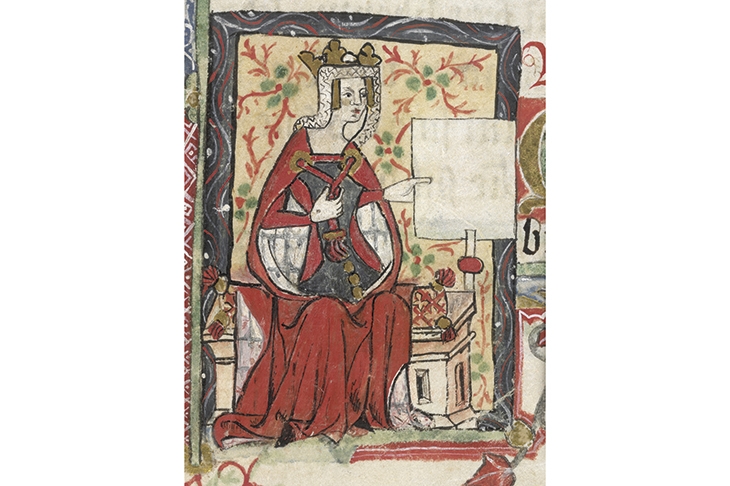The Empress Matilda, mother of the Plantagenet dynasty, is the earliest queen of England who never was; by rights she should have been England’s first ruling queen four centuries before Mary. But she never sat on the throne. In this authoritative but accessible biography, Catherine Hanley emphasises the fortitude and steel of a woman who, as a child, experienced all the harshness of medieval diplomatic reality, having to learn and adapt to international power politics from a very early age.
Born in 1102, she was only seven when her father, Henry I of England, arranged her betrothal to Heinrich V of Germany, 15 years her senior. The following year she was packed off abroad to complete her education and to prepare herself for her forthcoming role as empress. She married the newly crowned emperor when she was not yet 12 and lived in Heinrich’s territories of Germany and northern Italy for 16 years. It was a steep learning curve.
She was clearly a capable student: her husband’s confidence in her was such that he left her in charge of the imperial government in Italy while she was still in her mid-teens. This was a heavy responsibility: she presided over courts, pronounced judgments and negotiated with powers at the highest level. Hanley convincingly argues that Matilda performed with great skill and industriousness, easing the burden on Heinrich who had to contend with civil war and excommunication. She also accompanied her husband on campaign, picking up useful military know-how. These years seem to have been contented ones for Matilda. Her real troubles began when she was drawn back into English politics.
The death of her husband in 1125 left her without a leading role in German politics, and by 1127 she was back at her father’s court. Henry I, having lost his son William in the White Ship drowning of 1120, had made Matilda his heir: it was clear that she had acquired by this time what we would now call the skill-set to rule. Her second marriage to Geoffrey Plantagenet, Count of Anjou, gave her the embracing military arm expected for a queen; politically expedient, it was a personal ‘disaster’. Despite some furious family quarrels, Henry secured the oaths of his great men to support Matilda as his successor. There was also joy as the much younger Geoffrey finally provided Matilda with three children, the eldest of whom was to become the towering Henry II of England.
It was ultimately in her son’s interests that Matilda continued to apply herself to the world of politics and warfare when her cousin, Stephen, Count of Blois, seized the English throne on Henry’s death in 1135, leading to the civil war known as the Anarchy when it was said that ‘Christ and His angels slept’. But at least the two Henrys were ‘conveniently dead’ and ‘Matilda was, finally, almost free of male control’.
Alongside her heroic half-brother, Robert, Duke of Gloucester, she established her power base in the West Country. With Stephen’s capture at the battle of Lincoln in 1141, Matilda, now recognised as domina Anglorum, ‘Lady of the English’, then made a fatal misstep at her moment of triumph, when she was ‘within tantalising touching distance of the very top’. In the summer, on the point of having successfully negotiated with London for her coronation in the capital, she haughtily rejected the city’s demands for financial concessions. One chronicler claims that ‘her insufferable arrogance alienated the hearts of almost everyone’; another that Matilda had become ‘intolerable’ because she had ‘all the spitefulness of a woman’. (Hanley highlights the ‘gendered’ criticism of the monastic writers, but without overdoing it.) The result was an uprising, which forced her into hasty retreat and into a series of adventures that few middle-aged noblewomen have ever had to endure.
The next indignity followed at Winchester, where she narrowly escaped capture by rapidly riding off astride a horse, ‘like a man’. Then, besieged in wintery Oxford in December 1142, she evaded her enemies by camouflaging herself in white, courageously crossing the frozen Thames and trudging through the snow to Abingdon.
This is all dramatic stuff, told with great vim by Hanley. Matilda finally abandoned England in 1148; but she lived on for almost 20 years, holding a prominent role in Normandy (too briefly covered by Hanley) and seeing her son become king in 1154. The crown might have been hers, but the trouble with the Empress Matilda was that she was just too imperious.
This is excellent and reliable popular history, confidently relating the dramatic, compelling tale of a remarkable woman in remarkable times, even if her role as a ‘warrior’ was perforce limited. It is a shame that there are no endnotes, as one would normally expect from Yale, but this volume is designed for a wide readership and deserves to find one.






Comments